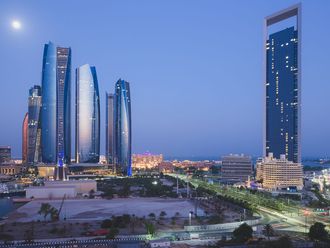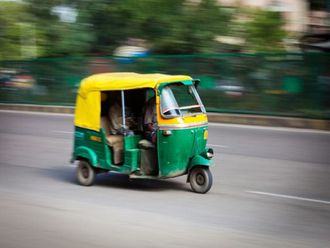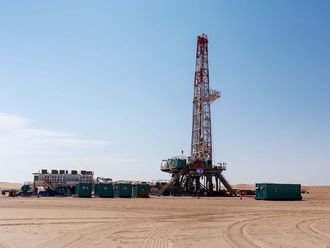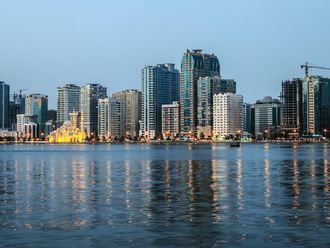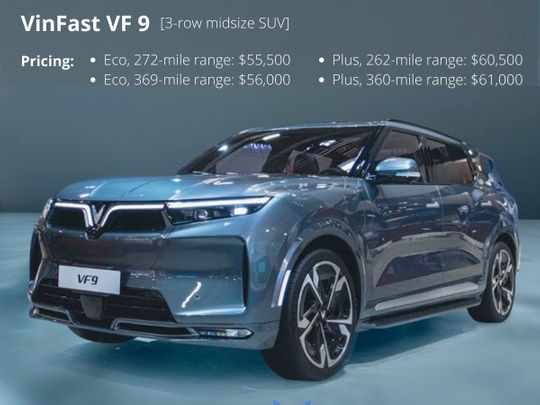
One of the newest entrants into the electric vehicle (EV) industry is VinFast from Vietnam. It doesn’t have the pedigree or band value of Teslas. Or, perhaps not yet.
The company has surprised many for its technologically-advanced products. There’s a “wow factor” highlighted by respected car reviewers.
This makes VinFast belong to a league of its own: it’s is not your ordinary EV maker. Many admit having had their head blown off on their first test drive.
Though relatively low-priced, and still low-volume, VinFast EVs are packed with high-tech features. Production is also expected to ramp up.
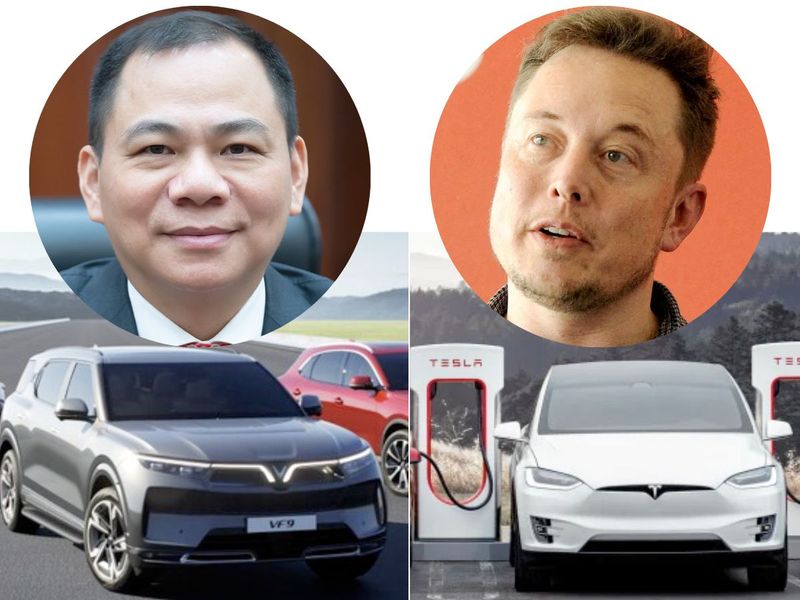
What would it take VinFast to complete in the tech and cost front?
Though virtually unknown, the company said it has already booked 65,000 global reservations since January for the VinFast VF 8 and VinFast VF 9 SUVs.
The privately-held automaker headquartered in Singapore was founded in 2017 and forms part of Vingroup, a Vietnamese conglomerate.
The largest conglomerate in Vietnam, Vingroup was founded by Pham Nhat Vuong, the country's first billionaire. Its operations encompass the technology, real estate development, retail, and service industries, from hospitality to healthcare.
VinFast makes EVs and electric scooters and is the first Vietnamese automaker to target the global market.
The company started shipping its first 100 electrified SUVs in September. It will open US/Canada dealerships next month (November 2022).
Tesla currently dominates global EVs sales, and is en route to producing more than 1.3 millions units this year.
This begs the question: Can VinFast ever threaten Tesla's hegemony or face Detroit head on in the US market?
Intense competition
VinFast is not by any means the only company vying for Tesla's top spot.
Tesla competes against new EV makers like Rivian, BYD, Nio, XPeng, as well as established ones like Volkswagen, Porsche, and the Jaguar Land Rover group.
The spike in supply comes from a huge unmet demand.
And unlike the legacy auto industry, two trends have emerged with EVs:
(1) The number of electric car makers from nations with a less well-known automotive history has increased.
(2) There’s an increasing emphasis in tech and software.
For example, prior to the EV revolution, Chinese automakers received virtually little international acclaim.
In terms of percentages, Europe, particularly in nations like Norway and Iceland, where EVs outsell combustion engines, is the largest EV markets, followed by China and the US.
> In 2021, around 2.9 million battery EVs were sold in China, a 162%jump from the previous year. Around 603,000 plug-in hybrid vehicles were sold in China in the same year, up 140% from the year before.
> In the US, EV sales in 2021, including all-electric vehicles (EVs) and plug-in hybrid electric vehicles (PHEVs), nearly doubled from 308,000 in 2020 to 608,000.
> EVs accounted for 73% of all plug-in EV sales, according to the US Department of Energy (DoE).
> Unit sales grew by 85% from 2020 to 2021 for EVs, while sales of PHEVs more than doubled, with an increase of 138% over the previous year, DoE reported.
Intense competition
Though a newcomer, VinFast has big ambitions. It aims to do in 10 to 11 years of existence something that Volvo Cars has not been able to achieve 95 years.
The company builds 200 cars a day on one, eight-hour shift in Vietnam. The goal: ramp up to two and eventually to three shifts to maximize its home plant’s 250,000 units of annual capacity.
The company only produced 35,000 automobiles in 2021.
In the next five to six years, it plans to produce 1 million electric vehicles.
Profitable in 3 years?
Chief Financial Officer David Mansfield expects VinFast become profitable within the next three years as part of its aggressive growth goals.
The company stated that it is moving quickly to address production concerns with a sizable new facility in Haiphong, north of Hanoi, which spans 84 hectares, at a media day in September.
In addition, a second new factory with a $2 billion initial investment is planned for phased development in North Carolina. At the height of the Covid-19 epidemic, VinFast backed out of its purchase of the former Holden factory in Lang Lang, Victoria.
Attractive offerings
The company's tech-loaded EV offers have surpised automotive analysts. The VinFast VF8, a mid-size eSUV, and the VF9, a full-size eSUV, are the two models currently on offer.
The VF8 starts at $40,700 in the US with a monthly battery subscription, with a claimed 292-mile (469-km) range on a single charge.
The VF9 starts at $55,500 with a monthly battery subscription and has an estimated range of 369 miles (593 km).
These ranges are comparable to those of their Tesla rivals, but both models are being sold at significantly lower prices.
The Model Y from Tesla has a starting price of US$65,990 and a range of 318 miles. The Model X, on the other hand, starts at US$120,990 and has a 223-mile range.
Futuristic features
Another surpise: Futuristic features loaded into VinFast EVs, including:
- > Voice-activated windows and temperature control
- > A sizeable screen
- > Use of inbuilt sim card
- > Face recognition device on the steering wheel
- > App / retail integration (i.e. allows drivers to place order food from their cars)
- > Traffic jam assist
- > Highway assist
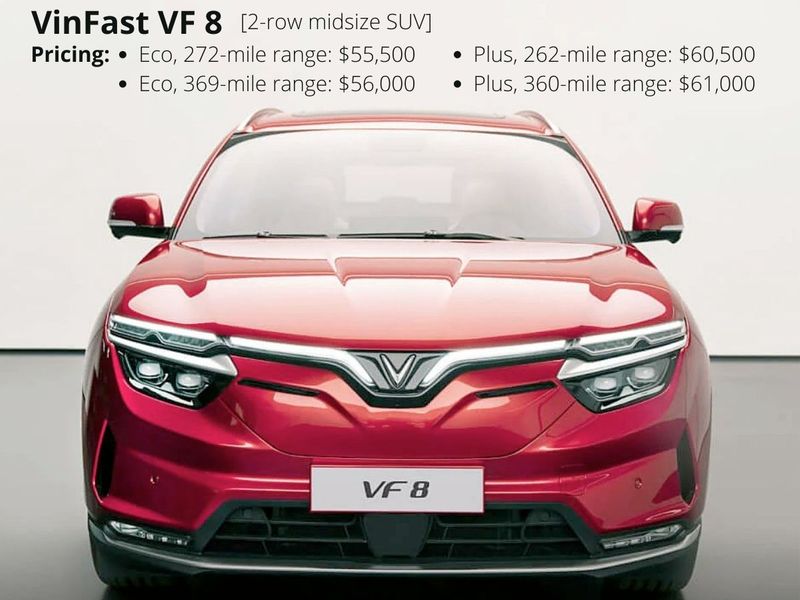
The key to VinFast's potential success will be its expansion into Western markets. Even if there may be a sizable market within China, Chinese producers have been eager to increase their presence in Europe and North America.
Despite its late entry in EV space, VinFast is rapidly growing. Given the constant threat of unpredictable trade wars, VinFast might also have a better chance of succeeding in Western markets than in Chinese businesses.
Supply chain development
In December 2021, Vingroup announced that construction on a $174 million battery cell plant for its VinFast EV project had begun in the Vung Ang Economic Zone of the province of Ha Tinh.
The startup plans to initially create 100,000 battery packs per year before bumpng up production to 1 million/year.
The plant won't likely be completely operational until 2025, according to consensus.
In 2022, VinFast has also been growing its supply chain and network. VinFast and Renesas Electronics Corp., a renowned provider of cutting-edge semiconductor technologies, struck a contract in September.
Renesas will supply a wider range of products to VinFast, including SoCs, microcontrollers, analog, and power semiconductors — a move seen boosting VinFast’s capacity.
Vietnam’s nickel mines
One factor that could support the development of the supply chain is Vietnam's potential emergence as a hub for nickel mining.
Since there is a relative abundance of nickel in the country.
The lithium-ion battery business needs the high-grade nickel sulfide mineralization that is present in Vietnam’s mines.
Now, Vietnam’s nickel mines that had been closed for financial reasons have now reopened due to the increase in battery demand.
Moreover, the Ta Khoa Nickel Project (TKNP), in the nation's northern Son La province, has just been taken over by the Australian business Blackstone Minerals.
In March, the Institute of Mining and Metallurgy Science and Technology estimated that Vietnam’s total nickel reserves and resources at 3.6 million tonnes of metallic nickel — concentrated mainly in the provinces of Thanh Hoa (3,067,020 tonnes), Son La (420,523 tonnes), and Cao Bang (133,677 tonnes).
Vertical integration
Like Tesla, VinFast wants to be vertically integrated EV maker, building its own electric motors and castings. It currently makes everything from plastic injection moldings, to subassemblies and seat frames, but not batteries.
How, the automaker will also start making its own battery cells and chips in Vietnam to address the chip supply chain crunch.
The VF8 and VF9 SUVs will start at $42,200 and $57,500, respectively, for US customers, excluding the cost to lease the battery.
In Germany, the VF8 midsize SUV will start at 45,700 euros and the VF9 large SUV at 62,250 euros, excluding the cost to lease the battery, which is 120 euros a month for the VF8 and 150 euros a month for the VF9.
To purchase the VF8 outright, forgoing the battery-lease option, in Germany the starting price is 61,700 euros for the VF8 and 82,250 euros for the VF9.
Sites in France include Paris, Marseille, Nantes, Rennes, Nice, Montpellier, Aix en Provence and Metz. At least 20 French stores are expected.
Sites in the Netherlands include Amsterdam, Rotterdam and Den Haag. At least 5 Dutch stores are expected.
Tesla rival?
EV competition that’s hotting up by the day. VinFast currently builds 200 cars a day on one, eight-hour shift in Vietnam.
The goal is to boost that to two shifts before the year ends and eventually to three shifts to maximize its home plant’s 250,000 units of annual capacity.
The North Carolina plant will have 150,000 units of annual capacity, the company said. It’s also looking for a location in Europe for a third factory.
VinFast is not without detractors. Many doubt its production targets. It has more affordable options than Tesla, or the likes of Porsche and Mercedes; yet marques like MG also offer less expensive EV products.
VinFast’s biggest advantage: Its founder and chairman, billionaire Pham Nhat Vuong.
VinFast Deputy CEO Michael Johnson, who worked at US automaker Ford for 2 decades, is bullish about VinFast's 1 million a year goal. “If he (Vuong) wants to do it, it’s done,” Johnson told Automotive News Europe.


